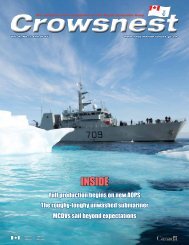Create successful ePaper yourself
Turn your PDF publications into a flip-book with our unique Google optimized e-Paper software.
In some regions, such as <strong>of</strong>f <strong>the</strong> Horn <strong>of</strong> Africa, piracy is assessed to be “a self-sustaining,<br />
low-risk/high pay<strong>of</strong>f proposition” that “as a result, pirate recruiting <strong>and</strong> <strong>the</strong> frequency <strong>of</strong> attacks<br />
will continue to grow.” 146 But because it, unlike terrorism, is a crime <strong>of</strong> opportunity, a strong<br />
constabulary-like response by various navies has <strong>of</strong>ten proven effective. Recent multilateral<br />
counter-piracy operations have proven remarkably successful as <strong>of</strong> late <strong>and</strong> <strong>the</strong> number <strong>of</strong><br />
incidents at sea has decreased. Confronting pirates with armed force can, <strong>the</strong>refore, have a<br />
salutary effect. One author has even suggested that, in recent years, some pirates have remustered<br />
as anti-piracy consultants, as that career-change has proven very rewarding in light <strong>of</strong> <strong>the</strong><br />
counter-piracy campaign. 147 Also, in some cases, <strong>the</strong> international response ultimately ends very<br />
badly for pirates, as happened in 2009 with <strong>the</strong> recapture <strong>of</strong> <strong>the</strong> SS Maersk Alabama. While <strong>the</strong>re<br />
is demonstrable value in attacking symptoms, many experts none<strong>the</strong>less argue that <strong>the</strong> root causes<br />
ashore cannot be addressed without more extensive <strong>and</strong> sustained international engagement.<br />
Regardless <strong>of</strong> <strong>the</strong> programme that over time is implemented, naval forces will undoubtedly play a<br />
role ei<strong>the</strong>r as <strong>the</strong> principal enforcement mechanism or as a security backstop.<br />
Even at a much reduced level, 148 piracy will likely persist given that “<strong>the</strong> piracy business model<br />
has been highly successful” with large sums transferred to pirate groups to free hostages <strong>and</strong><br />
ships. As one study noted, “it is a low cost activity that pays well.” 149 In 2011, it was estimated<br />
that US$146 million in ransoms was paid; leading one analyst to write that it was <strong>the</strong> “second<br />
largest generator <strong>of</strong> money in Somalia. 150 In that year, <strong>the</strong> aggregate cost <strong>of</strong> piracy to <strong>the</strong> global<br />
economy totalled about US$7 billion. 151 <strong>The</strong> impact <strong>of</strong> such illicit activity can be widespread, in<br />
costs <strong>of</strong> lives, increased insurance rates on ships <strong>and</strong> cargo, <strong>the</strong> high-cost <strong>of</strong> hiring security<br />
contractors to guard against pirate attacks, <strong>the</strong> expense <strong>of</strong> re-routing <strong>of</strong> ships, <strong>and</strong> increased<br />
energy costs in order to out-distance would-be attacks. Additionally, <strong>the</strong>re is <strong>the</strong> burden imposed<br />
on national governments that are required to deploy already stretched naval forces to protect<br />
cargo vessels <strong>and</strong> patrol shipping lanes.<br />
While <strong>the</strong>se implications might at first seem far removed from national economies, many <strong>of</strong> <strong>the</strong>se<br />
increased costs are transferred to consumers in <strong>the</strong> form <strong>of</strong> higher prices. But <strong>the</strong> impact <strong>of</strong> piracy<br />
ought not to be exaggerated, for it cannot do long-term damage to <strong>the</strong> global economy, nor is it a<br />
146 Gary E. Weir, “<strong>The</strong> answer may be on your Luncheon Plate: <strong>the</strong> Dilemma <strong>of</strong> Piracy in <strong>the</strong> Horn <strong>of</strong><br />
Africa”, Andrew Forbes (ed.), Papers in Australian <strong>Maritime</strong> Affairs, No. 30: <strong>Maritime</strong> Capacity Building<br />
in <strong>the</strong> Asia-Pacific Region (Sea <strong>Power</strong> Centre: Canberra, 2010), p. 71.<br />
147 “<strong>The</strong> complicated world <strong>of</strong> money, war <strong>and</strong> politics in Somalia <strong>and</strong> South Sudan: Book Review <strong>of</strong><br />
Alex de Waal, <strong>The</strong> Real Politics <strong>of</strong> <strong>the</strong> Horn <strong>of</strong> Africa: Money, War <strong>and</strong> <strong>the</strong> Business <strong>of</strong> <strong>Power</strong>”, <strong>The</strong><br />
Economist, 17 October 2015, pp. 86–87.<br />
148 While it is assumed that <strong>the</strong> number <strong>of</strong> attacks has fallen, it is not certain how many are taking place as<br />
shipping companies <strong>and</strong> commercial ship owners prefer not to report such incidents. Higher insurance rates<br />
<strong>and</strong> <strong>the</strong> ability to point to a clean record probably dissuade many from reporting incidents <strong>of</strong> piracy.<br />
See Alec Coutroubis <strong>and</strong> George Kiorktsoglou, “<strong>Maritime</strong> Piracy Analysis”, in Khalid Bichou,<br />
Joseph S. Szyliowicz <strong>and</strong> Luca Zamparini (eds.), <strong>Maritime</strong> Transport Security: Issues, Challenges <strong>and</strong><br />
National Policies (Edward Elgar: Cheltenham, UK, 2014), p.107.<br />
149 Martin Murphy, Small Boats, Weak States, Dirty Money – Piracy <strong>and</strong> <strong>Maritime</strong> Terrorism in <strong>the</strong><br />
Modern World (Columbia University Press: New York, 2009), p. 23.<br />
150 James Brown, Pirates <strong>and</strong> Privateers: Managing <strong>the</strong> Indian Oceans Private Security Boom, Lowry<br />
Institute for International Policy, Sydney, September 2012, p. 4. See also Christopher Alessi <strong>and</strong><br />
Stephanie Hanson, Combating <strong>Maritime</strong> Piracy, Council on Foreign Relations, New York, 23 March 2012<br />
[accessed on 30 June 2014 at www.cfr.org/piracy/combating-maritime-piracy/p18376].<br />
151 IMO, International Shipping Facts <strong>and</strong> Figures, Section 6.2.1.<br />
DRDC-RDDC-2016-R085 31




